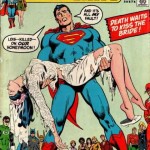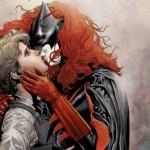Back in 1980, I was struck by what (at the time) was an outrageous idea.
Why can’t Superman marry Lois Lane?
The heart of the idea was that I was getting old enough to realize that the status quo in comics was stifling, and that not letting the characters advance in any way kept the stories from being anything more than kids’ stuff. Sure you were beginning to see books with better story telling come out, like the Chris Claremont run on X-Men, and the Wolfman/Perez relaunch of the Teen Titans. But, overall, the really big name comic characters seemed stuck in a story stasis that seemed to be permanent.
Of course this wasn’t an absolute. DC had characters like The Flash, the Atom, and the Elongated Man who all eventually got married. This also did not count characters like Hawkman and Hawkgirl, who started out married.
Also if you look at Marvel you had Reed Richards and Sue Storm who got married early in the run of the Fantastic Four, as well as Ant Man and the Wasp. But, like DC, it seemed that some characters( like Spider-Man) were destined for bachelorhood.
Then 1985 happened. With the release of The Dark Knight returns and Watchmen, comics suddenly became a venue for serious writing. You also had Crisis on Infinite Earths, which tore down the old DC continuity and relaunched the entire line. It took characters (like Superman) and, even though it restarted them, allowed for stories that advanced and felt like they really could grow dynamically.
From the time of the relaunch, you saw Clark Kent and Lois Lane go through all the stages of their relationship – from dating, to his revealing his identity to her, engagement, and eventually they did get married. Over all, it felt organic and was some very good story telling. It also opened up some fantastic storytelling, with the marriage being treated like one you see in real life if one of the partners is a fireman, or solider. But not all was peaches and cream; from the beginning of the relationship, there were detractors. Some were fans who did not like the break from the status quo. They wanted the Superman who appeared in the cartoons, or the Donner movies, and could not accept a more humanized version of the characters. Others were writers who chafed at having to write about a Superman who was in a healthy relationship, as they felt it constrained them.
In spite of this, for over a decade, you had Clark Kent and Lois Lane as a happily married couple, and they were not the only ones. Wally West (Barry Allen’s successor as the Flash) married his girlfriend Linda Park. Over at Marvel you even had Spider-Man get married.
This was also paired with the growing idea of the legacy character. You had Wally West pick up the mantle of the Flash after the death of Barry Allen. You even had Dick Grayson become Batman after the apparent death of Bruce Wayne. So you had comic characters growing and their stories progressing. It was a great time to be a comic book reader.
We should have known it wouldn’t last.
The first signs of this problem were over at Marvel, when it was decided to retcon away Spider-Man’s marriage. I’ve written about the specifics of that in the past, so I won’t rehash here. The basics however were that Editor-In-Chief, Joe Quesada, wanted Spider-Man reset to how he was written during his own youth.
Sure it annoyed fans, but it was nothing compared to what was going to happen over at DC.
The first sign of trouble was Emerald Dawn, which saw the return of Hal Jordan as Green Lantern. This was written by Geoff Johns, one of DC’s best writers. The problem wasn’t apparent at first, as Johns did not discard Kyle Rayner, Hal’s successor, but instead made all of the Green Lanterns a team.
The real signs of trouble came with Flash: Rebirth, which was the story that brought Barry Allen back to life, again written by Johns. While not stripping Wally West of his status as the Flash, he was quietly moved to the background.
DC was rolling back the status of its Universe to the Silver Age status quo.
There was another troubling factor going on at the time; there were writers complaining that writing for a married Superman, or even Flash was too hard.
This brings us to Flashpoint and the launch of the New 52.
I’ve written a lot about what a mess this entire relaunch was, but one of the biggest factors contributing to this was the loss of all the character progress that had occurred. I may not have minded so much if it had been a clean and total reboot, but the half assed way it was handled (with not really rebooting Batman and Green Lantern) made it more glaring that characters like Superman and the Flash lost all their development from all of those previous stories.
And, of course, a large part of this was that not only were Superman and The Flash not married any more, but that their wives (Lois and Iris) were not even their love interests. In fact, the writers went out of their way to make it clear that they were in no way romantically linked.
The part that really annoyed me was when DC Co-Publisher Jim Lee said that, once they got rid of Superman’s marriage, the stories just flowed. This implies that the marriage was the problem, and not his lack of skill as a writer.
But at least the DC Universe had some married couples, like Animal Man and Aquaman. Or so we thought.
This all came to a boil during what is now known here as the DC PR Meltdown; the week when DC could not keep their foot out of their mouth.
This is when everyone learned that DC editorial had pulled the carpet out from under the long planned wedding of Batwoman, and her girlfriend Maggie. When accused of shying away from a same-sex marriage, DC Co-Publisher Dan Didio said it was not the same-sex part that they were against, but the marriage part. He said that they did not want any of their characters married, because the level of sacrifice needed to be a hero did not allow for that kind of happy ending. He fundamentally said that no DC hero should be married. So, basically, a ban on marriage. He seems to believe all heroes need to be miserable. I am left to wonder how these clearly hack writers ended up in charge of the DC Universe. Of course, I am sure the answer is politics, but I digress.
Another DC editor was challenged, after these comments were made, to reconcile these comments with a character like Aquaman, who is successfully married to Mera. The editor said Aquaman and Mera were not married. It was pointed out that Aquaman, king of Atlantis, regularly refers to Mera as his queen. The editor countered that just because she is his queen, it does not mean they are married. This came as a surprise to series writer Geoff Johns, who had never been told they were not married.
The only hero allowed to be married was Animal Man, and that is because his marriage (and its slow collapse) was central to the story. Not that it was a happy marriage, which is why I guess it was ok.
So why has DC come out against marriage?
I reject Didio’s argument that heroes don’t get that kind of happy ending. First off, marriage is not an ending, it is a commitment to the most important person in your life. Also, it is not easy and comes with many challenges that can lead to dramatic moments. Superman and Flash writers were able to find those for all the years each characters was married.
I also reject the argument that marriage limits storylines. A good writer would not have that problem. The issue is that a lot of the current writers (and more importantly right now editors) are caught up in their childhood power fantasies, and their heroes being married doesn’t fit into them.
As for the overall all ban, I have a suspicion that it was an attempt to cover a bad decision. I think someone in the editorial chain did not want there to be a same-sex marriage. When the story broke big, I think Didio’s statement against marriage was an attempt to hold off the accusations of being homophobic, chiefly due to how ridiculous the claim that Aquaman and Mera are not married is.
In the end, I think the whole war on marriage that DC has declared is just another sign of how badly there needs to be a change in the editorial structure. Time will tell, I suppose.


